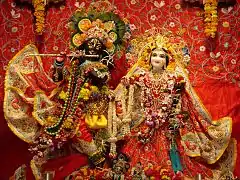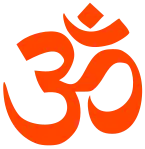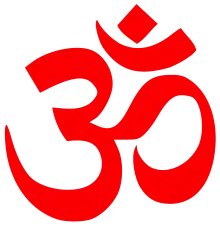Radhastami
Radhashtami is a Hindu holy day commemorating the birth anniversary of the goddess Radha, consort of the god Krishna. It is celebrated mainly by devotees of Krishna, especially with great fervor in her birthplace of Barsana, on the Shukla Paksha Ashtami of the Bhadra (Hindu calendar) month.[2][3] In the Viṣṇu Khaṇḍa of the Skanda Purana, it is mentioned that God Krishna had 16,000 friends called Gopi and gopikas, out of which Radha was the most prominent one of the revered 108. [4]
| Radhashtami | |
|---|---|
 Radhastami celebration at Krishna Balaram Mandir | |
| Also called | Radha Jayanti |
| Observed by | Hindus |
| Type | Religious, Cultural |
| Celebrations | Noontime Sringara at Mathura, Vrindavan, and Barsana. Manimahesh Yatra[1] |
| Frequency | Annual |
| Part of a series on |
| Hinduism |
|---|
 |
|
History and Significance
The Radharani was born on the 8th day (Ashtami) of the bright fortnight (shukla paksha ashtami) in the month of Bhadrapada month, Anuradha Nakshatra, 12 noon and As per the Gregorian calendar, 23 September 3221 BC - Wednesday at Barsana (Rawal), Uttar Pradesh, India. She was found and picked up by the Vrishbhanu and Keerti from a pond in Barsana. Her eyes were closed since her birth and was opened when for the first time when Shri Krishna appeared in front of her.[5]
Fasting and Celebration
Traditionally, followers of Gaudiya Vaishnavism (ISKCON devotees) observe Radha Ashtami Vrat (fast). Devotees will follow a half-day fast on this day. Like Ekadashi, some devotees observe this fast for full day and some even without water. In ISKCON temples Mahabhishek of Radharani is done on this day[6][7][8]
Radhashtami is ceremoniously celebrated in the Brij area. On Radhastami, Radha Krishna icons are traditionally dressed entirely in flowers. Additionally, Radhashtami is the only day on which devotees may receive darshan of Radha's feet. On all other days, they remain covered.[9]
Devotees will fast until noon and sing devotional songs in praise of the divine couple and their pastimes. Then a feast is served, most often including the Radha Red — a spicy, plum chutney.
The mantras which are chanted on Radhashtami are; Aum Vrashbahnujaye Vidmahe, Krishnapriyaye Dheemahi Tanno Radha Prachodyat and Jai Jai Shree Radhe.
Significance
The Manimahesh Yatra that starts from the Krishna Janmashtami ends in the Radhastami.[10]
References
- Ashtami- Significance And Celebrations
- Bhadrapada Festivals
- "Radhastami celebrations at ISKCON temple today". 6 September 2019. Retrieved 16 July 2020.
- Radha Ashtami festival
- "Radha Ashtami 2017: Significance, Mahurat Timings, Prasad and Pooja Rituals". 30 August 2017. Retrieved 16 July 2020.
- "Radhastami celebrations at ISKCON temple today". 6 September 2019. Retrieved 16 July 2020.
- "An ashtami that marks Radha's birthday". 27 August 2009. Retrieved 16 July 2020.
- "Radha Ashtami 2017: Significance, Mahurat Timings, Prasad and Pooja Rituals". 30 August 2017. Retrieved 16 July 2020.
- "An ashtami that marks Radha's birthday". 27 August 2009. Retrieved 16 July 2020.
- "No Manimahesh Yatra this year due to Covid". 16 June 2020. Retrieved 16 June 2020.
External links
- "Srila Prabhupada's Presentation of Srimati Radharani - First Radhastami celebration in ISKCON". www.sdgonline.org. Retrieved 8 September 2008.
- "Radhastami". www.krishna.com. Retrieved 3 September 2013.
- "Celebration of Radhashtami festival in Vrindavan". www.radhavallabh.com. Retrieved 4 December 2008.

